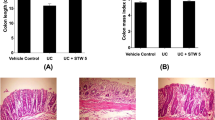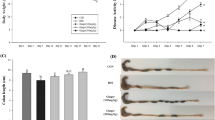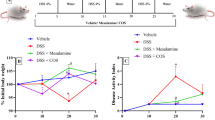Abstract
Promising results have recently been obtained with pre- and probiotic therapy in ulcerative colitis (UC). The prebiotic potential of lactulose is well established, but it has not yet been investigated in experimental colitis models. The purpose of the study was to examine the effect of lactulose on an UC model induced by 3% dextran sulfate sodium (DSS) solution added to drinking water for 7 days in male Wistar rats. Lactulose (300–1000 mg/kg) or 5-aminosalicylic acid (5-ASA; 150 mg/kg) was administered orally twice daily for 6 days. Colonic ulceration area, colon length, body weight changes, diarrhea/bloody feces, colonic mucosal myeloperoxidase activity (MPO), thiobarbituric acid reactive substances (TBARS), and histology were examined. Treatment of animals with DSS for 7 days resulted in severe colonic lesions accompanied by diarrhea, bloody feces, a decrese in body weight, shortening of the colon length, and an increase in MPO activity as well as TBARS, compared to normal rats. Lactulose treatment ameliorated DSS-induced colitis in a dose-dependent manner, and at 1000 mg/kg all of the parameters examined, except TBARS, were shown to improve significantly as compared to controls. Daily administration of 5-ASA also significantly reduced the severity of colonic lesions following DSS treatment. These results demonstrated the protectiv effect of lactulose in this rat colitis model and suggested that the background of this lactulose effect may be due to alterations of colonic microflora.
Similar content being viewed by others
REFERENCES
Farrel RJ, Peppercorn MA: Ulcerative colitis. Lancet 359:331–340, 2002
Borody TJ, Warren EF, Leis S, Surace R, Ashma O: Treatment of ulcerative colitis using fecal bacteriotherapy. J Clin Gastroenterol 37:42–47, 2003
Ishikawa H, Akedo I, Umesaki Y, Tanaka R, Imaoka A, Otani T: Randomized control trial of the effect of bifidobacteria-fermented milk on ulcerative colitis. J Am Coll Nutr 22:56–63, 2003
Hart AL, Stagg AJ, Kamm MA: Use of probiotics in the treatment of inflammatory bowel disease. J Clin Gastroenterol 36:11–19, 2003
Heller F, Duchmann R: Intestinal flora and mucosal immune responses. Int J Med Microbiol 293:77–86, 2003
Elson CO, Sartor RB, Tennyson GS, Riddell RH: Experimental models of inflammatory bowel disease. Gastroenterology 109:1344–1367, 1995
Shanahan F: Probiotics and inflammatory bowel disease: Is there a scientific rationale? Inflamm Bowel Dis 6:107–115, 2000
Fujiwara M, Kaneko T, Iwana H, Taketomo N, Tsunoo H, Kanno J, Ohkusa T, Okayasu I: Inhibitory effects of bifidobacterium longum on experimental ulcerative colitis induced in mice by synthetic dextran sulfate sodium. Digestion 67:90–95, 2003
Kanauchi O, Serizawa I, Araki Y, Suzuki A, Andoh A, Fujiyama I, Mitsuyama K, Takaki K, Toyonaga A, Sata M, Bamba T: Germinated barley foodstoff, a prebiotic product, ameliorates inflammation of colitis through modulation of the enteric environment. J Gastroenterol 38:134–141, 2003
Schultz M, Veltkamp C, Dieleman LA, Grenther WB, Wyrick PB, Tonkonogy SL, Sartor RB: Lactobacillus plantarum 299Vs in the treatment and prevention of spontaneous colitis in interleukin 10-deficient mice. Inflamm Bowel Dis 8:71–80, 2002
Rembacken BJ, Snelling AM, Hawkey PM, Axon ATR: Nonpathogenic Escherichia coli versus mesalazine for the treatment of ulcerative colitis: a randomized trial. Lancet 354:635–639, 1999
Venturi A, Gionchetti P, Rizello F, Johansson R, Zucconi E, Brigidi P, Matteuzzi D, Campieri M: Impact on the faecal flora composition of a new probiotic preparation. Preliminary data on maintenance treatment of patients with ulcerative colitis (UC) intolerant or allergic to 5 aminosalicylic acid (5-ASA). Aliment Pharmacol Ther 13:1103–1108, 1999
Guslandi M, Mezzi G, Sorghi M, Testoni PA: Saccharomyces boulardii in maintenance treatment of Crohn's disease. Dig Dis Sci 45:1462–1464, 2000
Gionchetti P, Rizzello F, Helwig U, Venturi A, Lammers KM, Brigidi P, Vitali B, Poggioli G, Miglioli M, Campieri M: Prophylaxis of pouchitis onset with with probiotic therapy: a double blind, placebo-controlled trial. Gastroenterology 124:1202–1209, 2003
Kanauchi O, Mitsuyama K, Araki Y, Andoh A: Modification of intestinal flora in the treatment of inflammatory bowel disease. Curr Pharm Res 9:333–346, 2003
Bezkorovainy A: Probiotics: determinants of survival in the gut. Am J Clin Nutr 73:399–405, 2001
Madsen K: The use of probiotics in gastrointestinal disease. Can J Gastroenterol 15:817–822, 2001
Madsen KL, Doyle JS, Jewell LD, Tavernini MM, Fedorak RN: Lactobacillus species prevents colitis in interleukin 10 gene-deficient mice. Gastroenterology 116:1107–1114, 1999
Szilagyi A, Rivard J, Shrier I: Diminished efficacy of colonic adaptation to lactulose occurs in patients with inflammatory bowel disease in remission. Dig Dis Sci 47:2811–2822, 2002
Krawisz JE, Sharon P, Stenson WF: Quantitative assay for acute intestinal inflammation based on myeloperoxidase activity: assessment of inflammation in rat and hamster models. Gastroenterology 87:1344–1350, 1984
Ohkawa H, Ohishi N, Yagi K: Assay for lipid peroxides in animal tissues by thiobarbituric acid reaction. Anal Biochem 95:351–358, 1979
Grisham MB, Granger DN: Neutrophil-mediated mucosal injury; role of oxygen metabolites. Dig Dis Sci 33:S6–S13, 1988
Yoshida N, Yoshikawa T, Yamaguchi T, Naito Y, Tanigawa T, Murase H, Kondo M: A novel water-soluble vitamin E derivative protects against experimental colitis in rats. Antiox Redox Signal 1:555–562, 1999
Schumann C: Medical, nutritional and technological properties of lactulose. An update. Eur J Nutr 41:17–25, 2002
Hoffmann K, Mossell DAA, Korus W, van de Kamer JH: Investigations on the mode of action of lactulose in the human intestine. Klin Wochenschr 42:126–130, 1964
Johansson ML, Molin G, Jeppsson B, Nobaek S, Ahrne S, Bengmark S: Administration of different lactobacillus strains in fermented oatmeal soup: in vivo colonization of human intestinal mucosa and effect of the indigenous flora. Appl Environ Microbiol 59:15–20, 1993
Hartley MG, Hudson MJ, Swarbride ET: The rectal mucosalassociated micro flora in patients with ulcerative colitis. J Med Microbiol 36:96–104, 1992
Sartor RB: Current concepts of the etiology and pathogenesis of ulcerative colitis and Crohn's disease. Gastroenterol Clin North Am 24:475–507, 1995
Fabia R, Ar'Rajab A, Johansson M-L, Willen R, Andersson R, Molin G, Bengmark S: The effect of exogenous administration of Lactobacillus reuteri R2LC and oat fiber on acetic acid-induced colitis in the rat. Scand J Gastroenterol 28:155–162, 1993
Mao Y, Nobaek S, Kasravi B, Adawi D, Stenram U, Molin G, Jeppsson B: The effects of Lactobacillus strains and oat fiber on methotrexate-induced enterocolitis in rats. Gastroenterology 111:334–344, 1996
Kruis W, Schuts E, Fric P, Fixa B, Judmaier G, Stolte M: Double-blind comparison of an oral Escerichia coli preparation and mesalazine in maintaining remission of ulcerative colitis. Aliment Pharmacol Ther 11:853–858, 1997
Axelsson LT, Chung TC, Dobrogosz WJ, Lindgren SE: Production of a broad spectrum antimicrobial substance by Lactobacillus reuteri. Microb Ecol Health Dis 2:131–136, 1989
Kaila M, Isolauri E, Soppi E, Virtanen E, Laine S, Arvilommi H: Enhancement of the circulating antibody secreting cell response in human diarrhea by a human Lactobacillus strain. Pediatr Res 32:141–144, 1992
Madsen K, Cornish A, Soper P, McKaigney C, Jijon H, Yachimec C, Doyle J, Jewell L, De Simone C: Probiotic bacteria enhance murine and human intestinal epithelial barrier function. Gastroenterology 121:580–591, 2001
Ulisse S, Gionchetti P, D'Alo S, Russo FP, Pesce I, Ricci G, Rizello F, Helwig U, Cifone MG, Campieri M, De Simone C: Expression of cytokines, inducible nitric oxide synthetase and matrix metalloproteinases in pouchitis: effects of probiotic treatment. Am J Gastroenterol 96:2691–2699, 2001
Author information
Authors and Affiliations
Rights and permissions
About this article
Cite this article
Rumi, G., Tsubouchi, R., Okayama, M. et al. Protective Effect of Lactulose on Dextran Sulfate Sodium-Induced Colonic Inflammation in Rats. Dig Dis Sci 49, 1466–1472 (2004). https://doi.org/10.1023/B:DDAS.0000042248.48819.ad
Issue Date:
DOI: https://doi.org/10.1023/B:DDAS.0000042248.48819.ad




